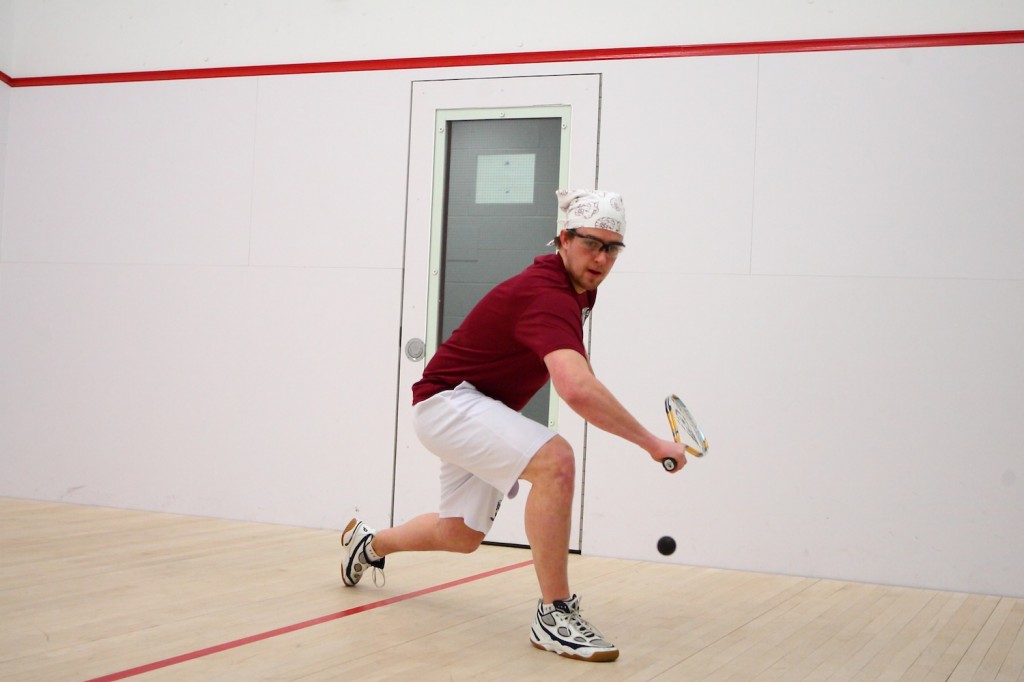Led By Experience, Squash Team Looks to the Future
December 7, 2011

The future looks bright for the Fordham squash team, as they are laying the foundation for a program that has the potential to be a formidable force in the near future.
The team is led by Head Coach Bryan Patterson whose primary job is director of squash at CitySquash, a non-profit organization aimed to help at-risk youth reach their full academic, athletic and personal potential. Patterson is also a fomer world-ranked squash player, ranking second in England and 16th in the world. He took over for the legendary Bob Hawthorn at the start of the 2010 season.
During his 54-year tenure at Fordham, Hawthorn coached both tennis and squash, but they were never separate teams. Instead, the squash team was mostly comprised of the tennis players who adapted to a new playing environment. Now with Patterson at the helm, squash is in its second season as an entirely separate entity from the tennis program and things are already improving. “We’re ranked number 41 right now which is great considering our team is so new,” Patterson said.
So far, the squash team is 2-9 on the young season after participating in the Navy Round Robin in November and, most recently, in the Wesleyan Round Robin this past weekend. At Wesleyan, Fordham competed against four other schools, three of which were among the top 40 in the country. The Rams entered the matches shorthanded with only seven of the 13 athletes in attendance but played well despite the disadvantage.
In squash matches each player on the team is ranked and they play a match against another player with the same ranking. Last weekend, the Rams were swept in all of their matches except for one set against Colgate where Andriy Kulak, Fordham College at Rose Hill (FCRH) ’12, the Rams’ number one player, managed a 12-10 victory in the third set. “The teams we lose to are ranked higher than we are,” Patterson said. “We’re going to get beaten, but we play the top teams and it helps us get better.”
The team practices five days a week for roughly two hours a day and they are preparing for the College Squash Association’s (CSA) team and individual tournaments held in February and March respectively. “The championships are the crux of the season for us,” Patterson said. “It serves as a gauge for how we are doing and our rank could go up because of it.”
“A lot of the teams we face have established great programs,” squash athlete Chris Souther, FCRH ’12 said. “This year we’re just working on fitness, getting out there and being competitive with other squads. The tournaments help us do that.”
Currently, the team is made up of mostly juniors and seniors who serve as mentors to the younger players. According to Souther, Matthew Ieraci, FCRH ’15, the youngest player on the team, is “a quick learner with great potential. We’ve all been helping him out and he takes note of everything.”
However, the team will need to eventually think about recruitment. Last year, the team lost two of their top five players to graduation and recruitment is the only way to avoid losing talent. Patterson knows that recruitment needs to happen and he’s excited to start. “We’re only in our second year so we have to build from the bottom which is exciting,” Patterson said. “If we get at least two recruits, we’re starting to go places. I think in two to three years we could have a great squad that could even be ranked in the top 20.”
Even though the squash team has recently become independent from the tennis program, it is clear that they are ready to build a competitive team. With the combination of Patterson’s years of squash experience and the possibility of new recruits on the horizon, the squad is in great shape to manufacture a successful program in the years to come.









